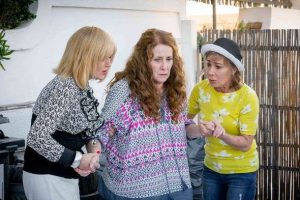Maybe it’s a sign of true equality in television when a woman writer gets a truly terrible drama screened on prime time, mainstream tv. But it’s a bit galling when the woman is one of British television’s most esteemed writers, Kay Mellor, and I am one of the target audience.
At a recent Royal Television Society’s event in London (‘Is Older the New Younger?’), there was a feeling among members of the panel that British television was treating older women better, even though there was still a way to go. Caroline Hollick, creative director at Red, felt that things had changed over the last few years and cited the success of her company’s BBC One drama, Last Tango In Halifax (2012-16), as evidence. ‘When we first pitched that show we were told that the story was too small and the characters too old,’ she said. Writer Sally Wainwright and Red fought to keep the romance between the elderly couple at the heart of the programme and Hollick felt that things shifted. Last Tango’s success indicated that ‘broadcasters have started to realise that people have an appetite to see themselves reflected on screen’.
Girlfriends was already on to the third of its six episodes by the time of the RTS event and Mellor was much lauded for having this on screen so soon after her BBC series Love, Lies & Records (2017-). Mellor’s track record goes back to Coronation Street in the 1980s and breakthrough feminist dramas, Band of Gold (1995) and Playing the Field (1998) as well as more recent success with The Syndicate (BBC, 2012-2015). Girlfriends’ central characters are Sue, Gail and Linda, childhood friends, now approaching their 60s and resuming their support for each other as husbands, mothers, children, lovers and the bureaucracies of modern life cause complicated problems and endless sub-plots. It has a starry cast of Miranda Richardson, Zoë Wanamaker and Phyllis Logan (Fig 1), with Wendy Craig and Paula Wilcox as support, and its prime time slot for ITV indicated the high esteem in which Mellor is held as a writer of popular drama.
In publicity for the show Mellor indicated that pushing the age of the women up to 60 was a deliberate decision: ‘Only 18 months or two years ago I was at a conference about women in our industry, and just about every woman in that room had something to say, and most of it was about feeling invisible and saying, “I only ever get to play grandmas. It’s never about my life. I’m somebody’s mother, girlfriend, it’s never about me” (BBC. At the RTS event, she confirmed that ‘I expected ITV to say “Can they be fortysomething?” but it didn’t happen…At one point I thought they could be pushing 70. Nobody put up a barrier.’
So what went wrong? The frantic overplotting meant that there was no room for the cast to breathe or a story to develop before it was overtaken by some other drama erupting. Characters appear literally out of nowhere: Sue’s son was not only discovered to be gay but he lived with a husband, two children and two mothers of his children who were all duly introduced but not developed. Battles were fought (Sue’s for her right to a job in the company she had helped set up, Gail’s for care for her mother and grandson, Linda’s for the ability to control her finances) but then dropped or perfunctorily wrapped up. The main characters are drawn with such broad strokes that the acting can only follow. Richardson has some fun with Sue’s spirited rantings though repetition makes them wearing. But Logan spends too much time looking gormlessly out from under her hair as she once again fails to follow what anyone has said and Wannamaker’s ditzy ditherings made the soft-hearted Gail even more irritating.
But the main problem is that Girlfriends can’t seem to take these older women seriously. Each of the main characters has their own plot but in the end the emphasis is on the death of Linda’s husband who falls (or was he pushed?) from a cruise ship. This story is revealed to centre on domestic abuse but the continual foregrounding of slapstick comedy in writing and performance means that it’s impossible to see that as anything other than a convenient prop for the plot and a good get out from any moral problems ITV might have had with the ending. It’s not that comedy can’t work with serious drama but that comedy seems to have become a necessity when older women are on the screen (see The Marigold Hotel franchise and Mum (BBC2, 2016-) which is about to start its second series). And the kind of comedy which Girlfriends uses – which depends on feminine incompetence – surely undermines its aspiration to speak to older women about their own lives. Slapstick comedy a la Lucille Ball is all very well when performed with confidence and brio but in this watered-down British version it comes over as a compulsive indecision which afflicts even the apparently successful Sue; at the age of 60, our heroines lack control not only over their lives but also over their confused and endlessly side-tracked minds and their uncoordinated and gawky bodies. (Figs 2 and 3)
I am not asking for an elderly version of the ‘progressive heroine’ but for something that doesn’t fall back on over-familiar stereotypes. At the panel, actress Lesley Sharp offered an acute analysis of her position when looking at parts: ‘the truth is that TV is an extraordinary medium. We only scratch the surface of what it’s capable of . . . We are not creating enough interesting stories about women of a certain age in an intelligent, vital, energised way. A lot of the 50-year-old characters I see on TV I don’t recognise as being part of my age group’. For me, nearly a decade on from Gail, Sue and Linda, that was the case with Girlfriends and the re-iteration of the (clichéd) pleasures of female friendship can’t override the fact that this is a missed opportunity.
Christine Geraghty is an Honorary Professorial Fellow at the University of Glasgow. Her publications on television include a contribution to the 1981 BFI monograph on Coronation Street; Women and Soap Opera (Polity, 1991); and My Beautiful Laundrette (I B Taurus, 2004). Her BFI TV Classic on Bleak House was published in 2012 and her reflections on the beginning of her work on soap opera appears in ‘The BFI women and film study group 1976 – ?’, Renewing Feminisms, Radical Narratives, Fantasies and Futures in Media Studies H. Thornham and E. Weissmann (eds) I B Taurus 2013. She is on the editorial board of the Journal of British Cinema and Television and sits on the advisory boards of a number of journals, including Screen.
References
Girlfriends trailer at https://youtube.com/watch?v=3jdMEzQqRNU
RTS event ‘Is Older the new Younger?’, 22nd January 2018 at https://rts.org.uk/article/rise-women-tvs-changing-attitudes, accessed 14th February 2018
BBC News, ‘Why these Girlfriends stand out in British’ TV http://www.bbc.co.uk/news/entertainment-arts-42225820), accessed 14 February 2018








Thanks, Christine a really good blog post to kick off what I hope will be a lot of discussion on this. I’ve yet to catch up with the series and everyone I know has put me off it for exactly these reasons. (All women viewers, which I guess is significant?) Might not, as your title indicates, there be too much stress on women writers to do it all since they still have fewer opportunities to do anything in TV Drama. Love , Lies and Records was a wonderful idea , well executed, so one ought to be able to give credit as you do. One or two male writers have been double commissioned recently and seem to have been forgiven for some not very uninspiring drama reaching our screens. All of this, of course, assuming authorship and responsibility rests primarily with the wrier which it seems to me might still warrant further discussion and research. Thanks a treat to finish my week on!